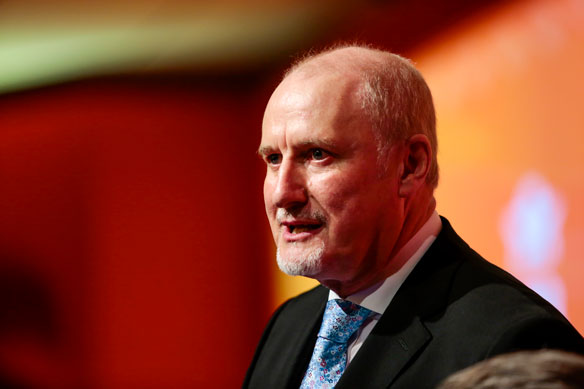
Doing the right thing
IATA taking aim at making air travel more accessible

Steele
MIKE DUNBAR
Making air travel accessible to every person is simply the right thing to do, according to IATA senior VP Paul Steele. But there’s also a business consideration since a US study into the spending power of adults with disabilities has shown that the travel and tourism industry is losing out on a significant chunk of business by not making air travel accessible.
Steele told an AGM press briefing, “As with every issue, aviation depends on a harmonized regulatory framework, and it is no different with accessibility.”
And he added, “If we can drive such a framework for our airlines, that is important for them but more importantly to the passengers they serve. So, if we get this right, everyone benefits.”
As a first step, Steele said IATA needs to put major focus on ensuring that policy and regulations related to accessibility are harmonized, stating, “We will be working closely with policy makers around the world to try to create a regulatory framework that increases access to air transport for persons with disabilities. Then there are the very practical considerations around how airlines provide the best services to those persons, so we will be focusing on our own industry.”
The senior veep stressed, “We cannot do this on our own. We have to work with governments, airports and, most importantly, the disability community because, if we don’t listen to what they need, how can we provide what they need?”
And he explained that the issue is not just limited to wheelchair passengers, adding that “travel agents should note that there are 15 disability codes that will provide assistance to people with other disabilities such as deafness and blindness.”
Steele also admitted that IATA itself needed to do a better job of getting the message out, recalling that the association has had an accessibility resolution on the books since 1952, but has failed to communicate that fact.
Meanwhile, during a phone-in press briefing on day one of the International Civil Aviation Organization’s 40th assembly last week, IATA director general Alexandre de Juniac pointed out, “The airline industry is committed to improving the travel experience for the estimated one billion people living with disabilities, and airlines reaffirmed this commitment in a resolution at this year’s AGM.”
But he warned, “The industry’s ability to ensure that passengers living with disabilities can travel safely and with dignity – in line with the UN Convention on the Rights of People with Disabilities – is being undermined by a steady increase in national and regional disability policies that are either not harmonized or are in direct conflict with each other.”
De Juniac stated, “With aging populations, the number of people travelling with disabilities is growing and will continue to grow, but to travel with confidence, they rely on consistent measures applied globally. And a harmonized global framework is equally essential for airlines to serve their customers with disabilities in a safe, secure, efficient and consistent manner.”
The DG revealed that IATA had submitted a working paper to the assembly recommending that ICAO develop a work program on accessibility for disabled passengers that includes a review of relevant ICAO standards and recommended practices and policy manuals, with due consideration to IATA’s core principles on the issue.
